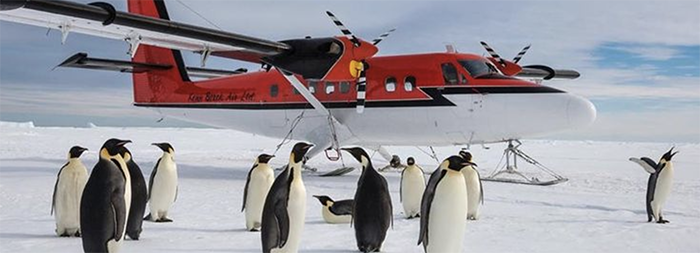
David Frum: Voting Against Trump
Notorious RINO and Atlantic writer David Frum joins Jamie Weinstein to explain why he’s voting for Kamala Harris this election. Frum, a former speechwriter for President…
Thought Leader: David Frum

The 9th Chapter of My “Ask Me Anything” Series
There are not many places in the world where your flight may be delayed by penguins on the runway, but in Antarctica, the wilderness still remains wild and free. I always suppress a grin when I see this image, as it seems like the emperor penguins are waiting to board.
When traveling on assignment or embarking on an expedition, moments like this allow me to pause and reflect on the world and how I make my living. It is humbling to think about how tiny our home planet is in the larger context of our solar system, and the universe beyond.
It is equally humbling to think about how enormous Earth is compared to an emperor penguin — or we humans, for that matter.
In all of it, though, for me, moments like the one captured here remind me that this planet we share is shared by all of us. Moments like this allow me to appreciate the simple joy of a life shared, such as waiting patiently to board a plane as the emperor penguins and I bask in the sunlight reflecting off the Antarctic ice. It’s these unexpected moments of shared appreciation for the natural world that bring me the most joy.
Every month, I answer some of the most frequently asked questions I have received over the years. Some of them are about the animals I encounter, while others may be about a particular image or an issue close to my heart that has been weighing on me.
As always, thank you for taking the time to inquire, and for supporting me on my journey.
* * *
Q: Does it smell bad when you visit penguins in the wild?
A: I would say no. I haven’t noticed, at least. When you stand overlooking a colony of 300,000 penguins, milling at the base of raw and ancient snowcapped mountains, the sight is so beautiful that any negative sensation is quickly overwhelmed. I have never stood there and thought, “Wow, these penguins smell bad.” Nothing of the sort has ever even crossed my mind.

Humpback whales feed on sardines in Monterey Bay, California.
Q: Of all the animals you have been close to, which had the worst breath?
A: Interesting question! I have felt the breath of wolves on my skin. I have been so close to bears that they fogged up my lens. Bears’ breath still had the scent of the fish they had been eating, but I wouldn’t say it smelled bad, just natural. One assignment in Monterey Bay, California, does jump to mind, though. I was photographing humpback whales as they surfaced after long feeding dives, and the lungfuls of air they exhaled in vast, wet clouds smelled like burned broccoli. I wouldn’t say that was particularly pleasant — though I suppose that was natural, too.

An orca, an apex predator, shepherds a massive herring bait ball in Norway.
Q: What is your favorite type of fish?
A: I have always had a fascination with fish – all fish, really. I love the look of a triggerfish, the bubbly personality of a blenny, the kinetic movement of a clownfish toiling away in an anemone. I see beauty in the collective shimmer of a big school of herring changing course on a dime, and I see a similar beauty in the incredible transformation of an aged salmon. I enjoy looking into the eyes of a 400-pound Māori wrasse and wondering if it is me he is interested in or the face reflected in my mask. They just make me smile.

A male spirit bear walks along a coastal stream in the Great Bear Rainforest.
Q: What is your favorite animal?
A: It is no secret that I am obsessed with bears. Over my lifetime, I have encountered roughly 3,000 polar bears, 2,000 grizzlies, and 1000 black bears in the wild. Many indigenous cultures consider bears to be mythical and shamanic. The Cheyenne call remedial plants “bear root;” the Nebraska Winnebagos’ bear dance is believed to have restorative powers; and the Huron, Kootenai, and Navajo peoples often invoke bears as healers in their stories, dances, prayers, and song lines. For the Dakota Sioux, merely dreaming of a bear is a sign of prophecy and a medicinal gift. I am just the latest in a long line of world travelers to appreciate these stately, magisterial beings. Whenever I have the opportunity to be close enough and see the wisdom in their eyes, there is never any question of why. Over the years, I have felt a special connection to the polar bears I have encountered if my life’s journey, especially early during my career as a photographer. They have allowed me unique glimpses into their lives, and I feel privileged to have borne witness to that. As a young man of little means in Churchill, Manitoba, I would volunteer my guiding skills to a local tourism operator, in exchange for the opportunity to spend time with polar bears every day. These bears have played a significant part in who I am today, and I have dedicated my life to conservation so that they may still be a part of our future. I can only hope my photography reflects the same reverence I feel for these bears to those who come after me.
* * *
Thank you so much to everyone that submitted a question, and stay tuned for AMA #10, coming soon. If have a question you want to ask, please feel free to do so in the comments below – you may receive an answer in an upcoming installment.
David Frum: Voting Against Trump
Notorious RINO and Atlantic writer David Frum joins Jamie Weinstein to explain why he’s voting for Kamala Harris this election. Frum, a former speechwriter for President…
Thought Leader: David Frum
This is the latest episode of Climbing Gold with Alex Honnold. Tucked away in a corner of Chilean Patagonia, Valle Cochamó wasn’t going to stay hidden…
Thought Leader: Alex Honnold
Sanjay Gupta: Self-Exams Matter
This is the latest episode of Chasing Life with Dr. Sanjay Gupta. Sara Sidner is a hard-hitting CNN journalist. Ananda Lewis is a content creator and former…
Thought Leader: Sanjay Gupta

